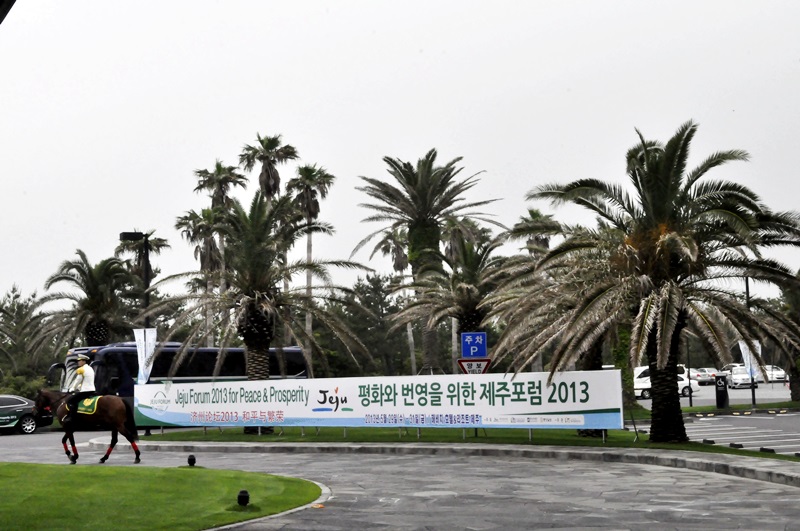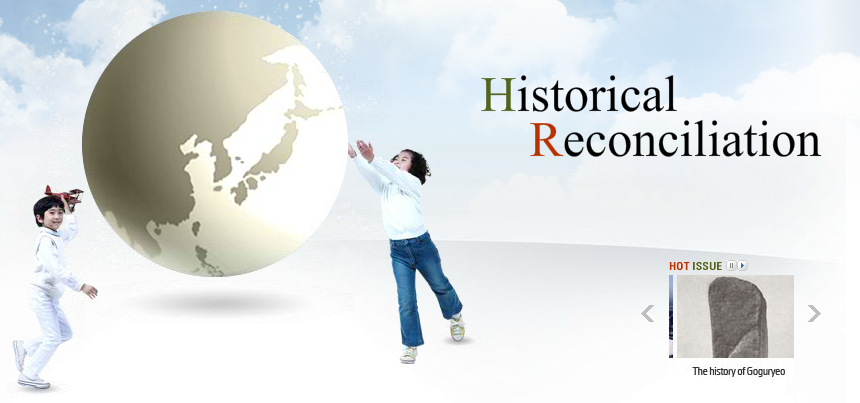|
Historical reconciliation and implications for the future of East Asia
Jeju Forum for Peace and Prosperity, 2013.
Organized by Northeast Asian History Foundation.
Delegates at Jeju Forum for Peace and Prosperity on Thursday, May 30 discussed the topic of Historical Reconciliations and Implications for the Future of East Asia in a session organized by The Northeast Asian History Foundation based in Seoul.
Historical reconciliation in East Asia is dominated by the issue of Japanese apology and reparations for atrocities committed during World War II and the colonization of Taiwan, Korea and China. In this session the discussion focused on how other models of reconciliation might inform the debate in Korea.
In the opening remarks Kim Hakjoon, NAHF president, focused on the “burden of continuity” for nations such as Japan in taking responsibility for historical actions. Kim introduced the example of Germany and how the nation had sought to overcome this burden through regional reconciliation. This was to become a dominant theme in the session.
Kim offered numerous examples of “true reconciliation” in the form of compensation such as in Australia and its native population, the United States and the apologies offered to the Japanese after internment during World War II, and then the case of German compensation to Poles and Jews, among others. Kim stressed the need for nations to “break with the past” and “relieve themselves” of historical burdens.
Kim reminded the audience that even Korea had taken this difficult step in its truth and reconciliation commission for post-Korean War crimes. The audience were also offered specific examples of how Germany had sought atonement, such as through compensation paid to Jews and how Nazism had been made illegal under German law.
German Bernhard Sliger then stepped in: ”it’s easy to talk about reconciliation, but it is not easy to achieve it.” Seliger stressed that Germany could not take the credit for the progress that had been made in terms of European reconciliation; credit lies with the French and Poles – and all European neighbours - who had extended the olive branch to them, “despite the crimes [they] had committed.”
Seliger took a long view on the issue and highlighted that many of the conflicts between Korea and Japan were also replicated in Europe: both shared a history of conflict that stretched back centuries, but there was also a shared cultural legacy that could be the basis for peace.
Reflecting on Kim’s opening remarks, Seliger was keen to stress the importance of taking the first step and fostering dialogue through youth exchanges and diplomatic channels. Thanks to the help of its neighbours, Germany’s atonement “is a burden for the past, not any more for the future – the Germans can be very grateful for that.”
All discussants agreed that the current climate was not conducive to reconciliation and Robinson made some proposals for how critical historical education in schools might be a useful first step in reconciliation. Talking of his time in high school, Kenneth Robinson said:
“We learned facts, but we also learned exposition and how to pose questions and construct arguments, and in the essay offer analysis of thesis statements,” he said.
| |
 |
|
| |
By taking a holistic view of Asian history and seeing points of similarity rather than difference the peoples of East Asia could be brought together, Robinson said. This would necessitate seeing “the past as a foreign country” and extending learning beyond the narrow confines of national history or university entrance exams.
The final discussant was Choi Woondo, who again sounded caution about the ability of the current climate to bring the nations together. He was particularly troubled by Shinzo Abe’s recent remarks about not understanding the meaning of invasion in light of Japan’s history and stated that youth in Japan “are not ready to accept [reconciliation].”
As questions went to the floor, former Australian politician, Gareth Evans, shared his opinion that the youth of Japan are not yet receptive enough: “the young people in Germany ‘get it’ but the Japanese just don’t,” he said. Robinson restated the ability of culture and exchanges to bring the nations together and the change he had seen in Japanese students who had learned Korean history.
Finally, Seliger returned to the German example and stated that although we should never forget history, it is good that wounds do heal in time. The proximity of lingering hatred in East Asia was something that surprised him as a European.
“To see how much bitterness it created as if it was yesterday – it is very interesting to see.”
For further information on the NAHF visit here.
Opening Remarks - KIM, Hakjoon (NAHF) (미정)
Moderator: Kenneth Robinson
Presenters: Kenneth Robinson (Visiting Fellow, NAHF)
Bernhard Seliger (Hanns Seidal Foundation)
Choi Woondo (Visiting Fellow, NAHF)
|





















